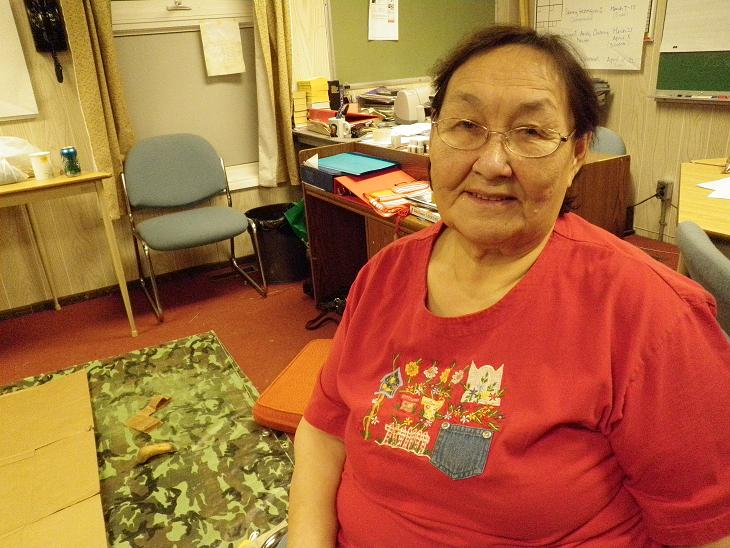An afternoon with elder Ragelee Angnako
Friday, January 28, 2011
Qikiqtarjuaq, Nunavut
We’ve been in town for four-odd days now working on our health and well-being stories. Today, we had the chance to speak to some of the local elders for their thoughts on these issues, including respected Qikiqtarjuaq elder Ragelee Angnako.
Angnako, 70, is an active and highly regarded member of the community. This afternoon we dropped in on her as she was teaching a fur-design class at the local Arctic College. Here’s some of our chat.
Why did you want to be a fur-design instructor here at the college?
(Fur design) is a tradition for us. I’ve been doing this for so many years. Clothes made out of fur are the best for the North, especially in winter for the men that go out hunting.
What’s the best kind of fur for the traditional clothes?
Seal. Harp seal. This is what we us to make kamiks (Inuit boots).
Is climate change affecting the quality of the seal skins that you work with?
I’ve noticed the weather this winter has changed. When we stretch out the seal skins in the winter, it usually takes us longer (then it has this year).
Is country food still an important part of the diet for people here?
Yes. Before we didn’t have store bought food, traditional food is best for us.
Why is country food better than food you buy in the grocery store?
We Inuit live up North where it’s very cold in the wintertime. Eating country food keeps us warm and keeps us with a full stomach for a longer period.
Is it hard to get your grandchildren to eat country food or are they more interested in store bought food?
Some of my grandchildren are like that but generally I’m really proud of my grandchildren and great-grandchildren because they like to eat our traditional food.
I’ve heard you belong to a walking group on Saturday evenings. How did you get involved in that?
As I’m getting older, I’m not active like I used to be, I’m trying to keep myself busy so I can be active again.
What goes on at the walking club?
The younger ones do 50 laps around the gym, the older ones do 30. I went over 30 last time and I’ll do it again tomorrow.
How do you feel afterwards?
I still have sore muscles today from last Saturday!
What advice would you give to young people living in North about staying healthy?
I just want to say to those who are younger: I’d like you to go on eating country food because it’s healthier for our body. Seal meat is the best for us. Also, keep the traditional clothing alive by making the traditional garments for your family. They’re the best type of clothes for the North.



